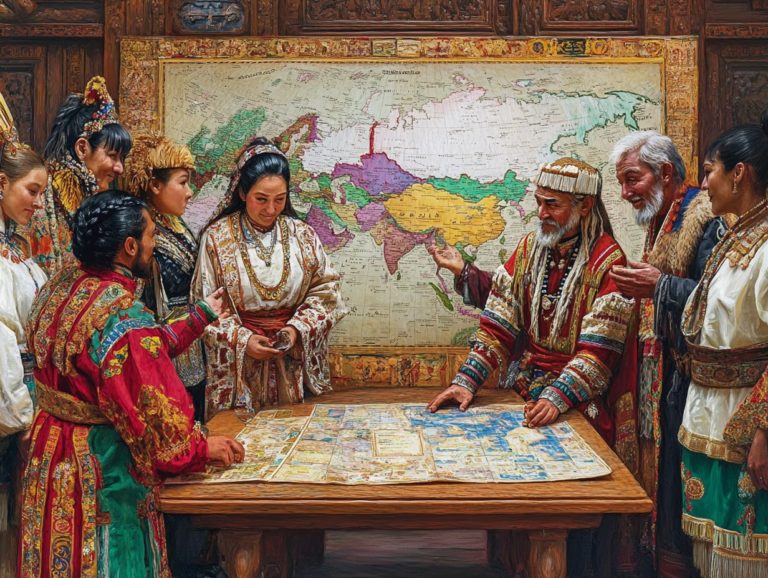the role of folklore in language education
Language education transcends the mere mastery of grammar and vocabulary; it s fundamentally about forging connections with culture and identity.
This article delves into the importance of folklore within language education. It illustrates how traditional stories, myths, and customs can enrich your learning journey.
By examining the cultural impact of folklore and presenting successful case studies, you ll discover practical strategies for weaving these narratives into your language curriculum.
The discussion will also address challenges and controversies that may arise, providing you with a well-rounded perspective on this essential topic.
Contents
- Key Takeaways:
- The Importance of Language Education
- What is Folklore?
- The Role of Folklore in Language Education
- Examples of Folklore in Language Education
- Incorporating Folklore in Language Curriculum
- Challenges and Controversies Surrounding Folklore in Language Education
- Frequently Asked Questions
- What is the role of folklore in language education?
- How does folklore help in language education?
- What are some examples of folklore used in language education?
- How can teachers incorporate folklore in language education?
- Can folklore be used in language education for all ages?
- Is folklore only beneficial for language learners?
Key Takeaways:

Folklore plays a significant role in language education. It provides cultural context and enhances language learning through storytelling, songs, and other traditional forms of communication.
Incorporating folklore into the language curriculum fosters cultural awareness. It also improves students’ language proficiency and communication skills.
Strategies for teaching folklore include using interactive activities, incorporating technology, and promoting critical thinking to engage students in the learning process.
The Importance of Language Education
Language education stands as a vital foundation for developing cognitive skills and cultural identity. It enables you to connect deeply with societies and their rich heritages.
According to the National Education Policy, effective language education not only hones your communication skills but also cultivates critical thinking, problem-solving abilities, and an appreciation for humanistic values each essential for thriving in a complex society.
It mixes different teaching methods, enriching experiential learning and crafting vibrant learning environments that nurture the collective identity of communities while fostering social cohesion.
Understanding the Impact of Language Education
The impact of language education reaches far beyond the confines of the classroom. It plays a crucial role in your cognitive development, social cohesion, and community engagement.
By equipping yourself with the ability to communicate effectively, language education fosters a sense of belonging and mutual understanding among diverse groups.
This enrichment sharpens your critical thinking and problem-solving skills. It also cultivates collaborative learning environments where the exchange of ideas thrives.
As you and your fellow community members learn to appreciate different linguistic perspectives, you contribute to an inclusive culture that celebrates diversity.
Strong language skills can deepen connections through shared experiences and open dialogue, ultimately leading to vibrant, resilient communities that flourish through cooperation and collective growth.
What is Folklore?
Folklore embodies a rich tapestry of cultural traditions. It encompasses oral traditions, storytelling, folk music, and proverbs that shape the essence of societies.
It acts as a reservoir of cultural artifacts, preserving historical events and imparting moral lessons. Thus, it offers you a glimpse into the shared values and practices that connect communities across generations.
Folklore transcends being just a reflection of cultural identity. It is a vibrant narrative form that cultivates social cohesion and enriches your understanding of cultural wisdom.
Defining Folklore and its Cultural Significance
Folklore can be understood as the traditional beliefs, customs, stories, songs, and practices that define a particular culture. It plays a pivotal role in shaping your cultural identity.
This rich tapestry of narratives and rituals does more than just entertain; it educates and instills values within communities.
Folklore serves as a vessel for collective memory, preserving historical events and social norms that resonate with current generations.
Through vibrant storytelling techniques and age-old traditions, it cultivates a sense of belonging and continuity. This allows you to connect deeply with your heritage.
The function of folklore in fostering societal cohesion is significant. It strengthens community bonds and provides a framework for understanding your place in the world.
These traditional practices offer valuable insights into the evolving dynamics of cultural identity. They enable a dialogue between generations as societies navigate the complexities of modern life.
The Role of Folklore in Language Education

Folklore is crucial in language education. It provides rich stories and cultural traditions that enhance learning experiences and engage communities.
How Folklore Can Enhance Language Learning
Folklore can significantly enhance your language learning journey. It introduces narrative forms that stimulate cognitive development and sharpen your problem-solving skills.
As you immerse yourself in stories passed down through generations, you re exposed to diverse linguistic structures. You are also encouraged to think critically about the contexts and moral lessons embedded within them.
Tales, fables, and myths engage your curiosity and capture your imagination. This transforms the learning process into something enjoyable and unforgettable.
Integrating folklore into your education allows you to explore cultural nuances and traditions. This enriches your understanding of the language.
This approach broadens your vocabulary and nurtures your emotional intelligence. It enables you to connect more profoundly with the content and its significance.
Examples of Folklore in Language Education
Explore case studies that showcase the powerful impact of folklore in language learning. These stories reveal how diverse cultural expressions enhance education.
Case Studies and Success Stories
Case studies and success stories show that using folklore in language education is effective. It nurtures cultural identity while enhancing linguistic skills.
For instance, a remarkable program in a rural school in Mexico integrated local legends and storytelling into Spanish lessons. As a result, students improved their vocabulary and comprehension while appreciating their cultural heritage.
Similarly, a project in Eastern Europe incorporated folk tales into English lessons. It significantly boosted students’ engagement and confidence in speaking.
These approaches emphasize contextual learning, where folklore connects language with identity, enriching the educational experience for everyone involved.
Incorporating Folklore in Language Curriculum
Incorporating folklore into your language curriculum requires innovative teaching strategies. These should harmonize with diverse methods while honoring community norms.
By doing this, you create a rich learning environment. This not only engages students but also connects them to their cultural heritage in meaningful ways.
Strategies and Techniques for Teaching Folklore

Great strategies for teaching folklore focus on hands-on learning with others. This deepens your appreciation for these cultural traditions.
By immersing yourself in the storytelling process, you can transform ancient tales into vibrant experiences. Engaging in activities like community storytelling events or crafting art projects strengthens this connection.
Group discussions allow you to share your thoughts and personal ties to various folklore tales. This encourages deeper reflection on the material.
Technology plays a crucial role too. Digital storytelling platforms empower you to create multimedia presentations that showcase your interpretations. Through these collaborative efforts, you foster a sense of community while gaining a richer understanding of diverse folklore traditions.
Challenges and Controversies Surrounding Folklore in Language Education
Incorporating folklore into language education comes with challenges. It raises important questions about how to represent cultures authentically.
Addressing Criticisms and Concerns
It’s vital to address concerns about folklore in language education. This practice respects and accurately represents cultural identities.
As an educator, you create an environment where students engage with cultural narratives. Incorporate diverse perspectives that highlight traditions while avoiding stereotypes.
Collaborate with community members and cultural experts. This ensures the materials you present are authentic and respectful.
By emphasizing accuracy and cultural awareness, you transform language education into a powerful tool for empathy. This helps learners from various backgrounds connect with each other.
Inclusivity enriches the learning experience and honors the voices that shape folklore.
Frequently Asked Questions
What is the role of folklore in language education?
Folklore enriches language learning by providing cultural context and diverse perspectives. It helps students gain a deeper understanding of the language they study.
How does folklore help in language education?

Folklore introduces learners to traditional stories, proverbs, and songs. This exposure boosts language skills and cultural awareness.
What are some examples of folklore used in language education?
Examples include folktales, myths, and traditional songs. These can teach vocabulary and grammar while sharing cultural customs.
How can teachers incorporate folklore in language education?
Teachers can use folklore as a teaching tool. They might create lesson plans based on folktales or use traditional songs to improve pronunciation.
Inviting guest speakers or organizing field trips can immerse students in local culture and traditions.
Can folklore be used in language education for all ages?
Yes, folklore can be adapted for different age groups. For younger learners, it introduces basic vocabulary, while older learners can explore complex structures.
Is folklore only beneficial for language learners?
No, folklore benefits native speakers too. It helps them understand their cultural traditions and preserve their heritage in an engaging way.





